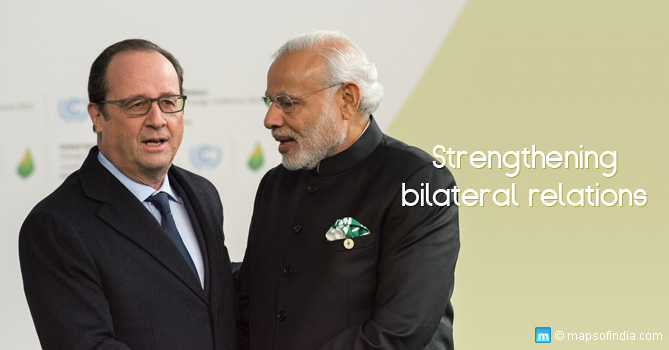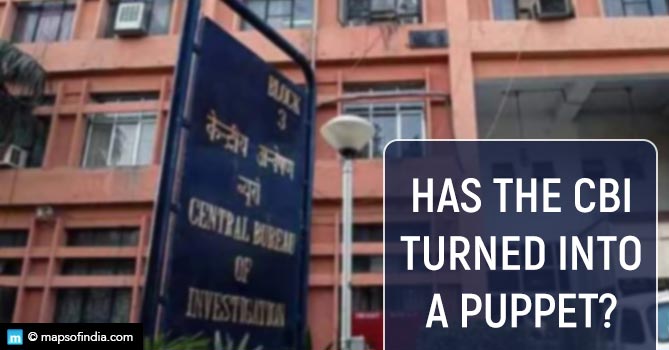The French President Francois Hollande landed in India on 24 January, 2016. Hollande’s visit is historic, as the French leader is India’s chief guest at the 67th Republic Day parade. The visit is also a silent declaration that France and India remain steady and unfazed in the face of terror attacks. The visit is important in another regard. The India-France Business Summit held in Chandigarh, City Beautiful, is a significant step in the development of economic ties and business cooperation between the two nations. Deals cannot wait, emphasised President Hollande.
Highlights of the India – France Business Summit
Both leaders, President Francois Hollande of France and the PM Narendra Modi of India addressed a gathering of CEOs and leading businessmen from both nations at the Chandigarh business summit. The two leaders, however, addressed a number of concerns other than business and finance as well. Ranging from terrorism and security to global warming and climate change, these issues make for important aspects of life in both nations. PM Modi was quick to highlight the similarities between France and India and said that a partnership between the two nations would be the ideal marriage of skill and technology. With “India’s talent and the manufacturing of France” great achievements are possible, said the PM.
Both President Hollande and PM Modi issued strong statements against terrorism and security threats that were faced by both nations. PM Modi appreciated France’s strength in the face of Paris attacks and emphasised the need for enhanced defence equipment and cyber security. This lead to PM Modi inviting French investors to join hands with India in defence manufacturing under the Make in India campaign. India is an excellent investment destination, said the PM, underlining “India is the fastest growing economy in the world. We have the labour and the market for your products”.
The other area of common interest that PM Modi highlighted is climate change and sustainable development. Congratulating President Hollande on his excellent coordination of the CoP 21 negotiations, Modi also invited investors to look at green economy, energy development, urban development, and transportation as possible areas to work together.
President Hollande said France was very keen on working with India and that the key purpose of his visit was to strengthen the partnership between the nations. “My visit has two main goals. Consolidate strategic partnership with India and implement decisions taken during PM Modi’s visit to France” said President Hollande. At the summit, he also announced that France would invest USD 1 billion into Indian enterprises and projects each year. This investment will be immediate and will be scaled up over time.
16 Agreements Signed
At the India France Business Summit in Chandigarh 16 business agreements and MoUs were exchanged between the two countries:
- The government of Maharashtra and the Agence Française de Développement signed an MoU pledging technical cooperation in an effort to develop Nagpur as one of the Indian smart cities (sustainable urban development MoU).
- The government of Chandigarh (UT) and the Agence Française de Développement signed an MoU agreeing to cooperate in the development of Chandigarh as one of the Indian smart cities (sustainable urban development MoU).
- The government of Puducherry (UT) and the Agence Française de Développement signed a similar MoU agreeing to cooperate in the development of Puducherry into another one of the Indian smart cities (sustainable urban development MoU).
According to the terms of these three MoUs, France will depute some of its public sector Urban Development experts to provide specific technical assistance in matters of solar energy usage, water systems, urban planning, waste management and will be stationed in these cities till the project is complete.
- The government owned Engineering Projects India (EPI) Ltd which undertakes a number of significant construction and infrastructure creation projects throughout India signed agreements with 9 French companies – Alstom Transport, CAN, Dassault Systems, EDF Energies Nouvelles, Egis, Lumiplan ITS India, Pomagalski, Schneider Electric and Thales. The MoUs signed between the 9 companies and EPI make way for technology sharing and cooperation in matters of urban development.
- Generation of sustainable and green energy is one key focus area that the Modi government has been emphasizing for a while now. Taking this forward another notch, an important agreement was signed between EDF Energie Nouvelles JV with SITAC RE India group. The two organizations shall enter into a joint venture and EDF acquire about half the stake in the renewable energy projects in the state of Gujarat. This agreement shall see a JV investment of about EUR 155 million in projects that are likely to generate some 142 MW wind energy.
- The French Alternative Energies and Atomic Energy Commission (CEA) exchanged letters of intent with CG (Crompton Greaves) and Green Ventures. CG and CEA will be collaborating in production and storage of solar energy for the sustainable functioning of Indian airports. The CEA and Green Ventures will work on solar photovoltaic projects in country’s rural areas. Their joint efforts are likely to work towards reducing the carbon footprints of rural Indians and deliver climate change benefits.
- Among the agreements signed was also the much awaited MoU between Mahindra and Airbus. The agreement makes way for a cooperation in building indigenous helicopters under the Make in India campaign. This deal was signed by the President and Managing Direcor of Airbus Group India, Pieree De Bausset, and President of Mahindra Aerospace, Prakash Shukla.
PM on Retrospective Tax
One very significant development at the India-France Business Summit was the Indian PM Modi’s take on the highly controversial retrospective taxation system that had hitherto kept foreign investors at bay and had reduced the ease of business in India. Assuring French investors that the NDA government had established a very stable and well calculated tax regime, he also said that retrospective taxation would no longer haunt investors as it had done in 2012. “This government is known for a stable and predictable tax regime…Retrospective tax is a matter of the past. That chapter will not be opened again,” said PM Modi. He also assured investors that the stable tax regime that has now been put in place is not likely to be changed or replaced in the next decade and half. India’s ease of business ranking has improved by about 12 points since the Modi-led government took over at the Centre; the change in taxation policies is one major reason for this improvement.





